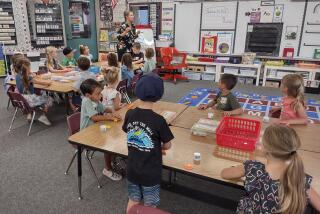Report Urges Major Changes in Teaching of Young Children
- Share via
California public schools should offer preschool programs for children as young as 3 years and 9 months and kindergartners should have fewer rote lessons and the option of going to school all day, according to a report on school readiness and early primary education released Thursday by state Supt. of Public Instruction Bill Honig.
Entitled “Here They Come: Ready or Not!” the report recommends major changes in the way young children are taught in the public schools. It calls for earlier, more individualized programs for young children and for more training, pay and status for their teachers.
The report grew out of the work of an 18-member School Readiness Task Force named by Honig last year. “I think it’s going to have a major impact on the schools,” he said.
There are about 350,000 kindergartners in California and as many as a million 4- to 6-year-olds.
Central to the report is an educational philosophy that describes young children as active, not passive learners. “Knowledge is not something that is given to children as though they are empty vessels to be filled,” the report says. The report urges that workbooks and ditto sheets be eliminated from the curriculum for children 4 to 6 years old in favor of more active educational experiences appropriate to the child’s stage of development.
Susan Thompson, an Education Department staffer who helped write the document, explained: “The basic message for school districts, teachers and parents is that young children don’t learn as effectively sitting at their desks as they do in manipulative, sensory, hands-on ways. Young children understand the concept of the number 4 better if they can count out four objects they can touch rather than filling in a ditto sheet with a pencil sitting at a desk.”
Honig said the report represents “the area that has been missing” in California’s educational reform. Longtime learning patterns are often set in kindergarten, he said, adding, “You’ve got to give these kids the proper start.”
Honig noted that, like the task force members, he opposes the practice of deferring kindergarten for some children because of low scores on standardized tests and of making some children repeat kindergarten.
The report notes that minority children, children who learn English as a second language and the children of unskilled parents are more likely to be held in kindergarten than more affluent white children. Children who are held back often do poorly in later school years, Honig said.
Among the report’s specific recommendations:
* Lowering the age at which children can start public school from 4 years and 9 months to 3 years and 9 months. This would allow school districts to receive state funds for pre-kindergarten programs for 4-year-olds.
* Reducing class size in the lower grades from the current average of 28 students to 24 students at an estimated cost of $200 per student. The report notes that California has the country’s second-largest average class size, after Utah. The child-to-adult ratio should be no more than 12 to 1, the report said.
* Creating educational programs that reflect the state’s cultural and linguistic diversity. The report notes that by the year 2000 the majority of the state’s 6 million schoolchildren will be minority children. It also estimates that 15% of the students will speak no English when they start school. The report calls for more bilingual teachers and aides in the early grades and an increase in the number of minority teachers.
* Experimenting with classes that mix 4-, 5- and 6-year-olds. Some research indicates both the younger and older children benefit.
* Requiring that all instructors of young children have both teaching credentials and training in child development. The pay and status of teachers of the youngest schoolchildren should be equal to that of other teachers.
* Offering optional all-day kindergarten classes as well as all-day programs for 4-year-olds.
* Providing more before-school and after-school care for young children who need it.
More to Read
Sign up for Essential California
The most important California stories and recommendations in your inbox every morning.
You may occasionally receive promotional content from the Los Angeles Times.










